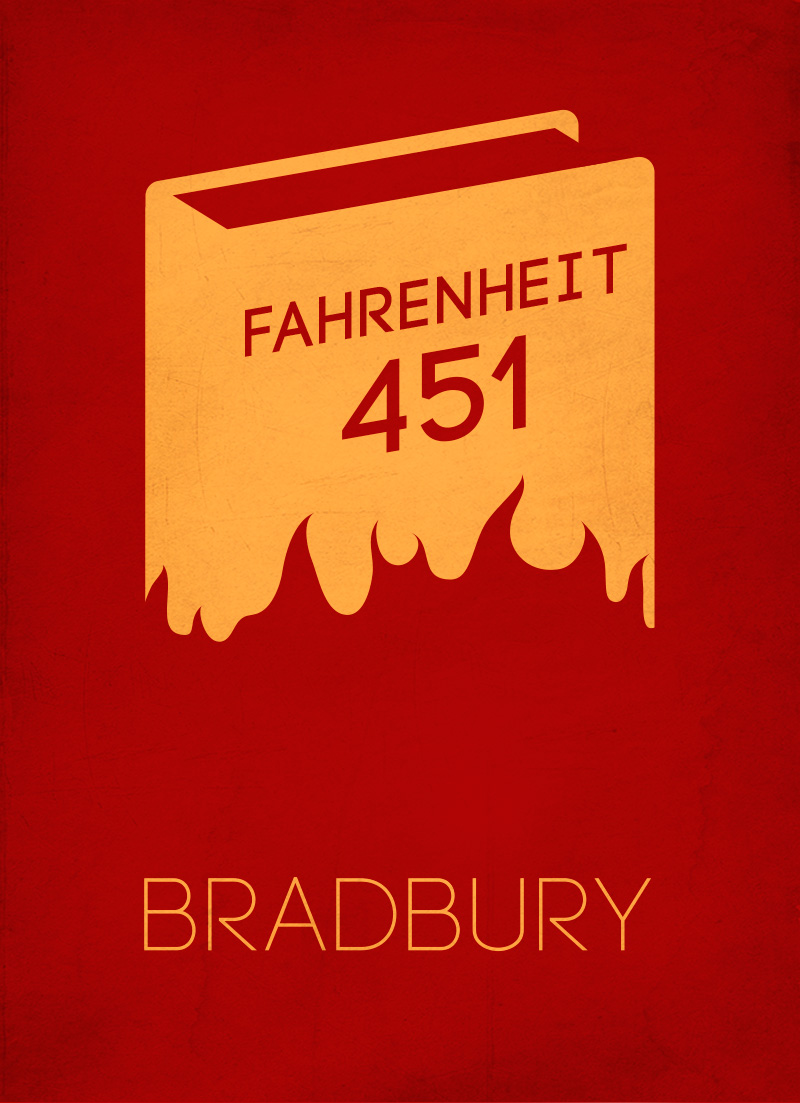RAY BRADBURY: FAHRENHEIT 451 – AN INTRODUCTION
October 19, 2019
In his book Seekers of Tomorrow, Sam Moskowitz writes that when Ray Bradbury was young, he advocated a political philosophy called technocracy, which predicted that the national economy was going to collapse in 1945. At that point a group of technocrats calling themselves Technocracy, Inc. (TI), would step forward and a series of appointed scientists would run the country according to scientific principles. Bradbury was later horrified to discover that TI was involved in Nazi book burning in Europe (a zealous attempt to enforce Nazi “scientific” principles). As an author, he took book burning personally, as he suggests in these lines from Fahrenheit 451:
“It’s not just the woman that died,” said Montag. “Last night I thought about all the kerosene that I’ve used in the past ten years. And I thought about books. And for the first time I realized that a man was behind each one of the books. A man had to think them up. A man had to take a long time to put them down on paper.”
Thus Bradbury used what was, to him, the horrific idea of book burning in his novel Fahrenheit 451 in response to another horrific situation: the persecutions resulting from a fear of communism (the Red scare) that gripped the nation at mid century.
The Red Scare
Although the USSR had been an ally during World War II, relations between that country and the West had been tense since the Bolshevik Revolution (1918-1921) that followed World War I. As first the USSR and then China adopted the relatively new political philosophy of communism, it seemed the world would eventually devolve into two massive armed camps: the communists and the anticommunists. The communists, however, were not all overseas. The American Communist Party hoped to replace democracy and capitalism with communism within the United States. Today, with the benefit of hindsight, this political ideology may seem sinister, but the stated goals of communism appealed to many idealistic people. Communists advocated an equitable sharing of wealth; the idea that those who did the work, rather than those who only supplied the money, should control the tools of production and profits; and a philosophy of protecting the weak. Early supporters were joined by others who deplored what they saw as American imperialism, attempts to become involved in or control the affairs of foreign countries and to annex territory outside the geographical boundaries of the United States, a widespread policy among industrialized countries since the turn of the century.
Meanwhile, the political situation in Europe in the late 1930s became increasingly volatile. In 1938, shortly before World War II began, the U.S. House of Representatives established a committee to investigate “un-American” activities among the country’s citizens. Originally it investigated what it considered suspicious activities of those from both the political left and the political right. By 1947, however, when the House Un-American Activities Committee (HUAC) opened hearings on suspected communist infiltration of Hollywood, only those on the political left had anything to fear from the committee.
And “fear” is the appropriate word. The committee was determined to expose and discredit anyone in a position to advance the communist cause in the powerful entertainment industry, and accusations were abundant, often with little or no evidence. A series of “unfriendly witnesses” were called before the committee and asked to acknowledge that they were communists and to name fellow communists. When they refused to name “fellow travelers,” several were jailed, and many were blackballed by the major Hollywood studios. This year, 1947, is when Bradbury—who lived in Los Angeles and had many friends in Hollywood—wrote “The Phoenix,” the seed story that would become Fahrenheit 451.
In 1950, Senator Joseph McCarthy—taking advantage of the growing animosity between East and West—proclaimed, “Today we are engaged in a final, all-out battle between communistic atheism and Christianity.” McCarthy sponsored hearings in the Senate similar to those conducted by HUAC, but they were aimed at more diverse targets, from congressmen to high-ranking military officers. These hearings were prosecuted with such vigor and acrimony that the Wisconsin senator gave his name to the modern witch hunt: “Mc-Carthyism,” personal attacks on individuals by means of widely publicized indiscriminate allegations, especially on the basis of unsubstantiated charges. In February 1951, Bradbury’s story “The Fireman” (a sort of middle stage between “The Phoenix” and Fahrenheit 451) was published.
Criticizing the Hysteria
The charged atmosphere created by powerful figures such as McCarthy made it dangerous to speak out directly against the persecution, but many artists found ways to condemn the fears and injustice. Arthur Miller’s play The Crucible, for example, debuted on Broadway in 1953, the same year Fahrenheit 451 was published. This powerful drama takes as its overt subject the Salem witch trials of 1692, but the underlying message is about the destruction of innocent people when fear, hysteria, and indiscriminate accusations rule—a not-too-subtle attack on McCarthyism.
Bradbury’s book is a slightly more oblique attack, although he has stated that he did intend it as a criticism of McCarthyism. In Fahrenheit 451 he mourns not only the government’s determination to tell people what to think and to destroy those who show any signs of independent thought, but the people’s willingness to stop thinking—and reading— for themselves.
Book burning and repression of thought and ideas are far from the only themes in Fahrenheit 451. The novel comments on many other aspects of modern life that Bradbury deplores, and it is a striking vindication of his vision that many of the aspects of modern life he deplored at that time are even more pronounced today.
Source: Readings on Fahrenheit 451, [edited] by Katie de Koster; Greenhave Press



No comments:
Post a Comment